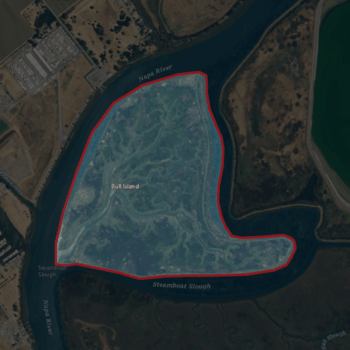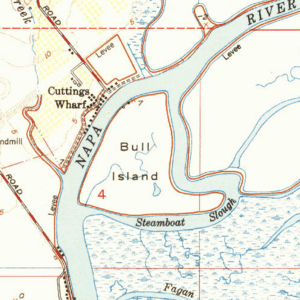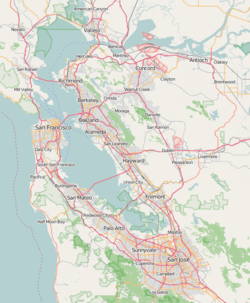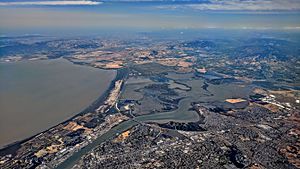Bull Island (California) facts for kids

USGS aerial imagery of Bull Island
|
|
| Geography | |
|---|---|
| Location | Northern California |
| Coordinates | 38°13′20″N 122°18′24″W / 38.22222°N 122.30667°W |
| Adjacent bodies of water | Napa River |
| Highest elevation | 3 ft (0.9 m) |
| Administration | |
|
United States
|
|
| State | |
| County | Napa |
Bull Island is a small piece of land surrounded by water in the Napa River. This river flows into San Pablo Bay, which is part of the larger San Francisco Bay in California.
The island is located in Napa County. It's an important natural area. Bull Island is managed as part of the Fagan Marsh Ecological Reserve. This reserve is right next to the Napa-Sonoma Marshes Wildlife Area.
In 1981, the United States Geological Survey (USGS) measured the island's height. Bull Island is about 3 feet (about 1 meter) above sea level. Its exact location is 38°13′20″N 122°18′24″W / 38.22222°N 122.30667°W.
Contents
What is Bull Island?
Bull Island is a natural island in the Napa River. It's not very big, but it's an important part of the local environment. Islands like Bull Island are often formed by rivers. They can also be left behind as water levels change.
Where is Bull Island Located?
Bull Island is found in the northern part of California. It's specifically in Napa County. The island sits within the Napa River. This river eventually flows into San Pablo Bay. San Pablo Bay is a large body of water connected to the famous San Francisco Bay.
Island's Position in the River
The island is located upstream from San Pablo Bay. This means it's further inland along the river. It's surrounded by the river's waters. The area around it is mostly marshland and wetlands.
Protecting Nature on Bull Island
Bull Island is part of a special area called the Fagan Marsh Ecological Reserve. An ecological reserve is a place set aside to protect plants and animals. These areas help keep nature healthy.
Why are Reserves Important?
Ecological reserves like Fagan Marsh protect important habitats. Habitats are the natural homes of plants and animals. These reserves help make sure that different species can survive and thrive. They are like nature's safe zones.
Bull Island's Role in Wildlife
Because it's part of a reserve, Bull Island likely provides a home for various wildlife. This could include birds, fish, and other small creatures. The surrounding marshlands are especially important for many types of birds.
Island Facts and Features
Bull Island is a low-lying island. This means it's not very high above the water. Its elevation is only about 3 feet (1 meter). This makes it part of the unique landscape of the Napa River area.

How Islands are Measured
The United States Geological Survey (USGS) is a science agency. They study the Earth's landscape. They measure things like island elevations. This helps us understand the land and its features.
Maps and Aerial Views
Maps, especially topographic maps, show the shape of the land. Aerial views, like those from airplanes or satellites, also help us see islands. They show how islands fit into the bigger picture of the landscape.





